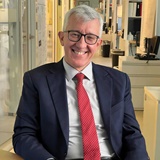


Dr. Alpdoğan KANTARCI holds a D.D.S. and a Ph.D. degree. He is a Board certified specialist of Periodontology (C.A.G.S.) and a Diplomate of the American Board of Periodontology. He is a Professor (Senior Member of the Staff) at the ADA Forsyth Institute in Cambridge, MA, USA. Dr. Kantarci is an Associate Professor at Harvard University School of Dental Medicine and Adjunct Professor at Boston University’s Henry Goldman School of Dental Medicine.
He completed his doctorate studies at Istanbul University's Department of Periodontology and moved to the USA as a postdoctoral fellow at Boston University. He completed his clinical periodontology specialization training (CAGS) at Boston University.
He is the clinical director at the ADA Forsyth Institute and works as an active periodontist and implantologist. Dr. Kantarci has mentored more than 60 theses and directed and taught in several graduate and postgraduate clinical and didactic dentistry courses. He serves on the editorial board of more than 20 dental and medical scientific journals.
His research interests include Molecular Mechanisms and Resolution Pathways of Oral Inflammation in Periodontitis and the Link to Systemic Diseases, Experimental Models, Clinical Applications of High-Throughput Analysis in Dental Research (e.g. xMAP Multiplexing), and Biology of Tooth Movement. He holds several patents.
He has published more than 210 articles in peer-reviewed scientific journals, written book chapters, and presented more than 500 oral talks.
“Periodontal regeneration aims to restore the structural and functional integrity of tissues damaged due to periodontal disease and re-establish the homeostatic balance of the dentoalveolar system in a healthy manner. Studies in this area have shown that it is not possible to regenerate alveolar bone, cementum, gingiva, and periodontal membrane separately; for example, it has been found that bone grafts alone cannot provide adequate periodontal regeneration. It has also been demonstrated that healing remains limited in terms of other approaches where mechanical methods are applied (e.g., barrier membranes). Therefore, there is a need for new approaches to periodontal regeneration. It is not possible to reverse periodontal destruction and achieve tissue regeneration without considering the microbial and inflammatory mechanisms that result from a pathological process. This presentation will examine regeneration approaches developed in light of biological mechanisms while using these biological principles. The role of stem cells, nanotubes, multiple carriers, and growth factors in periodontal regeneration will be discussed alongside inflammatory and microbial mechanisms.”